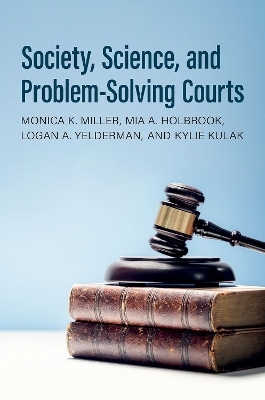
Society, Science, and Problem-Solving Courts
Oxford University Press Inc (Verlag)
978-0-19-005980-4 (ISBN)
- Lieferbar (Termin unbekannt)
- Versandkostenfrei
- Auch auf Rechnung
- Artikel merken
Society, Science, and Problem-Solving Courts takes a broad social science approach to explain what societal factors brought about development of the wide variety of problem-solving courts, and what factors prevent such development or make problem-solving courts unnecessary. The book also investigates the role of science and technology in the development, enforcement, and evaluation of problem-solving courts. It is this combination of society and science that makes problem-solving courts possible.
Monica K. Miller joined the University of Nevada, Reno in 2004 after receiving her J.D. and PhD from the University of Nebraska system. Her interests involve the application of psychological theories and justice principles to laws, policies, and court procedures. Specifically, she is interested in social cognitive biases (i.e., gender and religion-based prejudice) and individual differences in moral and legal decisions (e.g., jury decisions); how the law regulates the family; how community sentiment and science relate to law; how problem-solving courts address social issues; and the well-being of those who interact with the legal system (including the use of therapy dogs). Mia A. Holbrook joined the University of Nevada, Reno in 2019 after receiving her PhD in Criminal Justice and Criminology from Washington State University. Dr. Holbrook's research interests and expertise lie in evidence-based practices and model fidelity; program and policy evaluation; equitable practices in the criminal justice system; problem-solving and specialty courts; organizational trust & collaboration; perceptions & attitudes; and instrument validation. Logan A. Yelderman earned his BA in Psychology and Communication Specialist in 2011 from Baylor University and his PhD in Social Psychology in 2016 from the University of Nevada, Reno. His research interests involve topics at the intersection of social psychology, religion, and law with an emphasis on legal decision-making. His research typically includes experimental and non-experimental designs related to jury and parole decision-making, juvenile drug courts, religious fundamentalism, and the interplay between cognition and emotion. Kylie Kulak earned her BA in Psychology at Fresno State University in 2020, her MS in Psychology at Arizona State University in 2022, and is currently a Social Psychology doctoral student at the University of Nevada, Reno. Her research interests focus on emotions and extralegal factors that can influence jury decision-making, such as race and gender. She also has an interest in the therapeutic effects of facility dogs in the legal system.
Section 1: Introduction to Problem-Solving Courts
Chapter 1: Society, Science, and Problem-solving Courts in the U.S. and Abroad
Chapter 2: Overview of the Types of Problem-Solving Courts
Mia A. Holbrook and Mary Dhondt
Section 2: The Science of Problem-Solving Courts
Chapter 3: The Justice Principles of Problem-Solving Courts
Logan A. Yelderman, Mia A. Holbrook, Jennifer L. Lanterman, Alicia DeVault, Monica K. Miller
Chapter 4:The Psychology of Problem-Solving Courts
Chapter 5: Scientific Methodology used in Evaluations and Problem-Solving Courts
Chapter 6: Effectiveness of Problem-Solving Courts
Mia A. Holbrook and Mary Dhondt
Section 3: Society and Problem-Solving Courts
Chapter 7: When Law and Culture Collide
Chapter 8: Problem-Solving Courts and the Social Mind-set Model
Monica K Miller, Kylie Kulak, and Amber Westbrook
Section 4: The Development (or Not) of Problem-solving Courts
Chapter 9: Why Some Countries Have Problem-solving Courts
Waleed Jami, Kylie Kulak, and Monica K. Miller
Chapter 10: Why Some Countries Do Not Have Problem-solving Courts
Section 5: Problem-solving Courts: Looking to the Future by Looking at the Past
Chapter 11: The Benefits (Pros) and Drawbacks (Cons) of Problem-Solving Courts: A Scientific Understanding of Variations in Perspectives Across Societies
Conclusion
Chapter 12: Society, Science, and Problem-solving Courts: Yesterday, Today, and Tomorrow
References
| Erscheinungsdatum | 16.11.2024 |
|---|---|
| Verlagsort | New York |
| Sprache | englisch |
| Maße | 168 x 242 mm |
| Gewicht | 662 g |
| Themenwelt | Geisteswissenschaften ► Psychologie |
| Recht / Steuern ► Allgemeines / Lexika | |
| Recht / Steuern ► EU / Internationales Recht | |
| ISBN-10 | 0-19-005980-X / 019005980X |
| ISBN-13 | 978-0-19-005980-4 / 9780190059804 |
| Zustand | Neuware |
| Informationen gemäß Produktsicherheitsverordnung (GPSR) | |
| Haben Sie eine Frage zum Produkt? |
aus dem Bereich


